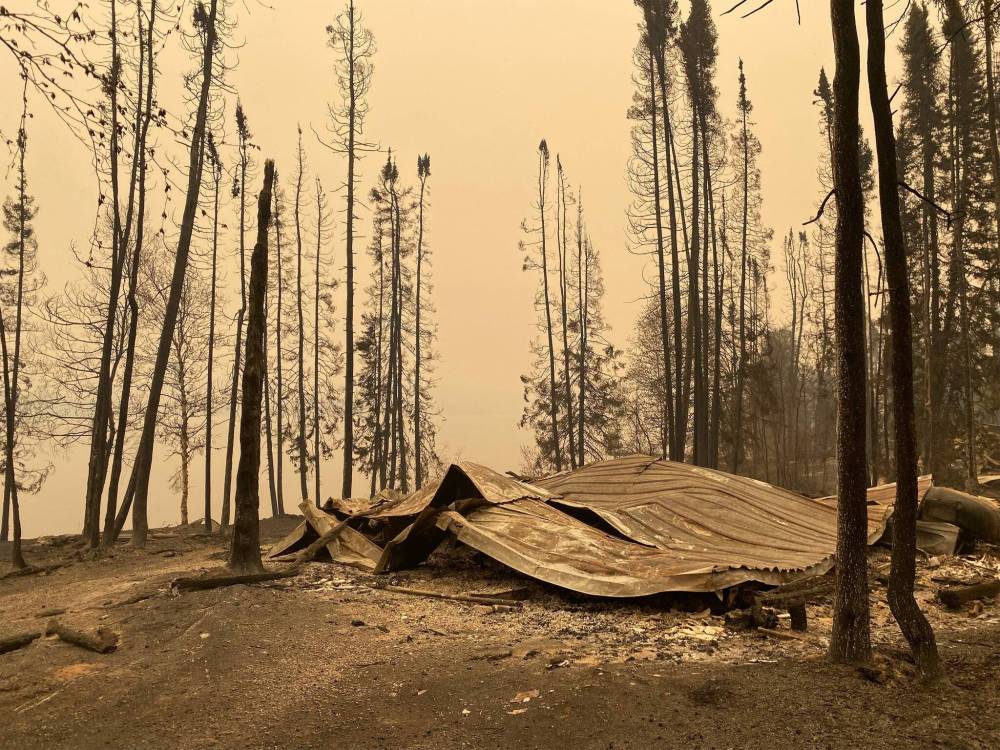‘Things could get worse from here’
Long-term forecast casts shadow on vicious wildfire season, Manitobans warned
Advertisement
Read this article for free:
or
Already have an account? Log in here »
To continue reading, please subscribe:
Monthly Digital Subscription
$0 for the first 4 weeks*
- Enjoy unlimited reading on winnipegfreepress.com
- Read the E-Edition, our digital replica newspaper
- Access News Break, our award-winning app
- Play interactive puzzles
*No charge for 4 weeks then price increases to the regular rate of $19.00 plus GST every four weeks. Offer available to new and qualified returning subscribers only. Cancel any time.
Monthly Digital Subscription
$4.75/week*
- Enjoy unlimited reading on winnipegfreepress.com
- Read the E-Edition, our digital replica newspaper
- Access News Break, our award-winning app
- Play interactive puzzles
*Billed as $19 plus GST every four weeks. Cancel any time.
To continue reading, please subscribe:
Add Free Press access to your Brandon Sun subscription for only an additional
$1 for the first 4 weeks*
*Your next subscription payment will increase by $1.00 and you will be charged $16.99 plus GST for four weeks. After four weeks, your payment will increase to $23.99 plus GST every four weeks.
Read unlimited articles for free today:
or
Already have an account? Log in here »
Hey there, time traveller!
This article was published 19/06/2025 (190 days ago), so information in it may no longer be current.
Manitoba’s wildfire season — already one of the most catastrophic in recent memory — could still get worse, an official cautioned Thursday, while the province prepared to move evacuees out of a Thompson shelter.
Kristin Hayward, assistant deputy minister of the Manitoba Wildfire Service, said it’s difficult to predict what will happen this summer.
“What the long-term forecasts are showing us is prolonged periods of warmer than average temperatures, possibly lower than normal precipitation,” she told reporters.
“We’re coming into a season where we see a lot of thunderstorms and a lot of lightning passing through, so things could get worse from here. I won’t sugarcoat it, but hopefully they don’t.”
Hayward said new fires caused by lightning are anticipated after recent thunderstorms, with high fire danger across a lot of forested areas.
Manitoba reported 21 active fires Thursday. Seven were out of control. Hayward said crews have made steady progress immediately around Flin Flon.
SUPPLIED Crystal Antila's cabin was one of almost 30 cottages or homes that were destroyed by the wildfire in Burge Lake Provincial Park near Lynn Lake. 
The evacuated town was threatened by a blaze that was more than 370,000 hectares in size.
“There has been active open flame on the fire in a number of spots,” Hayward said. “The precipitation that we received has really all dried up now, so we did see a lot of fire activity (Wednesday).”
Manitoba has recorded 125 wildfires this year, above the 20-year average of 120 for June 19. More than 903,000 hectares — an area about 19 times the size of Winnipeg — have burned.
“To say the impact was devastating would be an absolute understatement … The Burge Lake area looks nothing like it used to.”–Crystal Antila
Manitoba recorded 322 wildfires, which burned 275,920 hectares, in 2024, up from 300 fires and 198,633 hectares in 2023, as per a Canadian Interagency Forest Fire Centre annual report.
The province is aware of about 130 structures that have been destroyed, a spokesperson said.
Crystal Antila, a criminal lawyer and volunteer firefighter with the Rural Municipality of Springfield, said her cottage was one of close to 30 cabins or homes that were destroyed in Burge Lake Provincial Park near Lynn Lake.
Antila, who was part of a five-person crew from Springfield who helped battle fires in the Lynn Lake area, said Burge Lake was a “majestic” forested area, but it looked like a “wasteland” after flames roared through it.
“To say the impact was devastating would be an absolute understatement,” said Antila, who grew up in the Lynn Lake area and bought her cottage about 18 months ago. “The entire cabin area is destroyed, with only (six) cottages that remain standing. The Burge Lake area looks nothing like it used to.”
She hailed the Town of Lynn Lake’s fire department. Some members lost properties at Burge Lake, she said.
“They’re working around the clock. They’ve had to deal with losses of their own, and they’re continuing to fight every day for other people’s properties,” Antila said.
In a statement on social media, the Town of Lynn Lake said the wildfire service had not yet given clearance for evacuees to return, after an assessment found there remained a safety risk.
“They’re working around the clock. They’ve had to deal with losses of their own, and they’re continuing to fight every day for other people’s properties.”–Crystal Antila on Lynn Lake’s fire department
The town said the local hospital’s emergency room was anticipated to reopen Thursday, but some essential services had not yet been fully restored.
Christine Stevens, assistant deputy minister of the Manitoba Emergency Management Organization, said 14 communities remain evacuated. It is down from a peak of close to 30 earlier this month.
The fires prompted one of the largest evacuations in Manitoba history, with more than 22,000 evacuees, said Lisa Naylor, the minister responsible for the organization.
About 25,000 evacuees fled the catastrophic 1997 Flood of the Century in the Red River Valley.
An estimated 300 evacuees from Pimicikamak Cree Nation were moved to Niagara Falls, Ont., up to three weeks ago. They were waiting to find out when they will be flown home, after residents who were scattered across Manitoba started going back Monday.
“I’m ready to go back, but I’ll wait if I have to wait,” evacuee Michael McLeod, 36, said by phone from Niagara Falls. “Hopefully, we’ll go home soon.”
McLeod, who is with his father, Robert Farmer, said some evacuees are anxious to reunite with family and friends.
SUPPLIED Pimicikamak Cree Nation wildfire evacuees Michael McLeod, right, and his father, Robert Farmer, have been staying in a hotel room in Niagara Falls for more than two weeks. 
“Living in a hotel is tiring. You miss your own place, your own bed,” he said.
More than 7,000 residents were forced to leave Pimicikamak and neighbouring Cross Lake on May 28.
Ontario’s government has said about 2,300 evacuees from Manitoba were moved to Niagara Falls.
Stevens said it might take some time to bring those Manitobans home.
“Work is underway to plan for that, but we’re mindful of the hotel occupancy and vacancy rate in Winnipeg, and other factors, so that’s being done diligently to ensure that the return home can be done in a way that allows people to come home in the least stressful way possible,” she said.
Indigenous Services Canada spokeswoman Jacinthe Goulet said the federal department is working with Pimicikamak, the Canadian Red Cross and Xpera, a private company involved in the evacuation to Niagara Falls, to repatriate the First Nation’s evacuees.
“I’m ready to go back, but I’ll wait if I have to wait … Hopefully, we’ll go home soon.”–Evacuee Michael McLeod.
It is working with other communities to “monitor and assess opportunities” to move their evacuees from Ontario to Manitoba.
“The majority of evacuees are expected to return directly to their home communities rather than returning to other communities in Manitoba,” Goulet wrote in an email.
Naylor said the province was trying to find hotel rooms for about 114 evacuees who were in a congregate shelter in Thompson. Some have been in the shelter for close to three weeks.
“We have worked really hard, but because we can’t find rooms in the area, we are looking at moving people to a different location in Manitoba, and that’s going to be sorted out over the next probably 24 to 48 hours,” Naylor said. “Folks have been there a really long time, and that was never the intention.”
Winnipeg’s lone remaining shelter — at the Leila Avenue soccer complex — had no evacuees as of Thursday afternoon, after hotel rooms were found, Naylor said.
The site will stay open in case any evacuees require shelter. As of 4 p.m. Friday, the complex will become the primary 24-7 reception centre for evacuees, replacing the existing one at Billy Mosienko Arena.
Shelters at the Century Arena, Eric Coy Arena and RRC Polytech’s Notre Dame Avenue campus in Winnipeg, and a site in Portage la Prairie are no longer in use.
chris.kitching@freepress.mb.ca

Chris Kitching is a general assignment reporter at the Free Press. He began his newspaper career in 2001, with stops in Winnipeg, Toronto and London, England, along the way. After returning to Winnipeg, he joined the Free Press in 2021, and now covers a little bit of everything for the newspaper. Read more about Chris.
Every piece of reporting Chris produces is reviewed by an editing team before it is posted online or published in print — part of the Free Press‘s tradition, since 1872, of producing reliable independent journalism. Read more about Free Press’s history and mandate, and learn how our newsroom operates.
Our newsroom depends on a growing audience of readers to power our journalism. If you are not a paid reader, please consider becoming a subscriber.
Our newsroom depends on its audience of readers to power our journalism. Thank you for your support.









